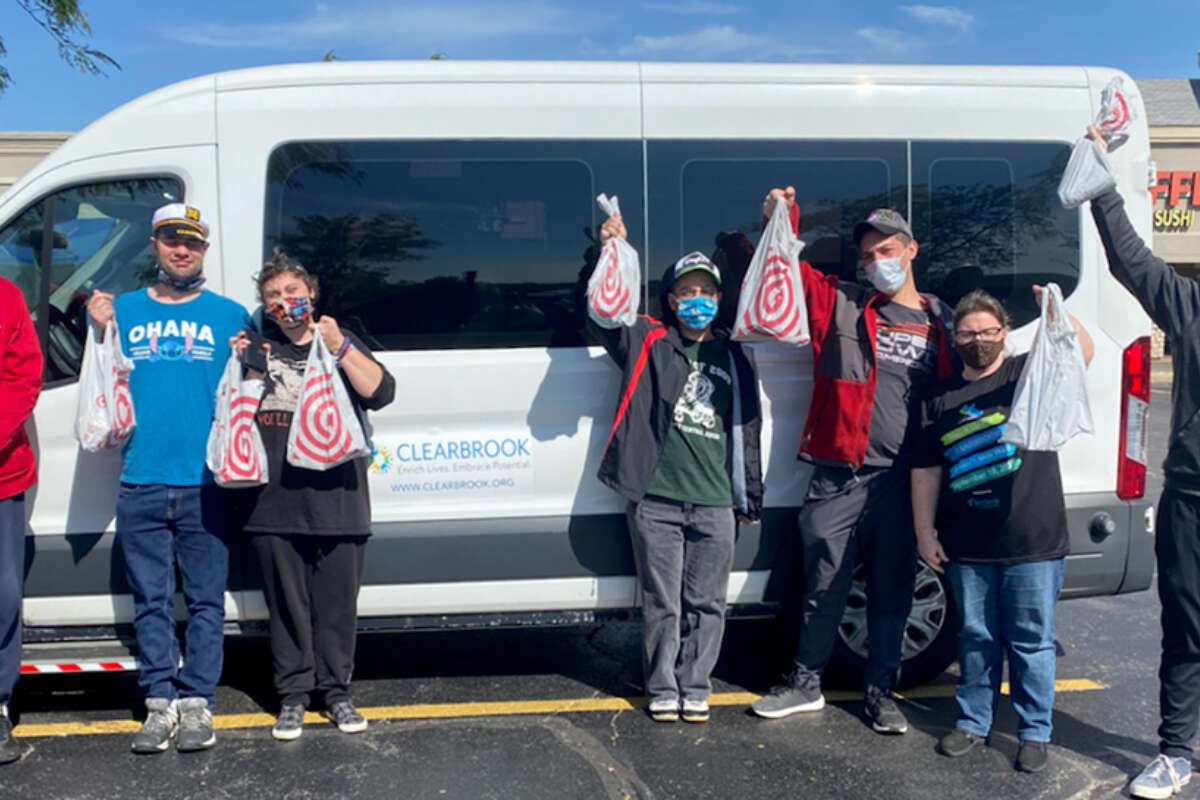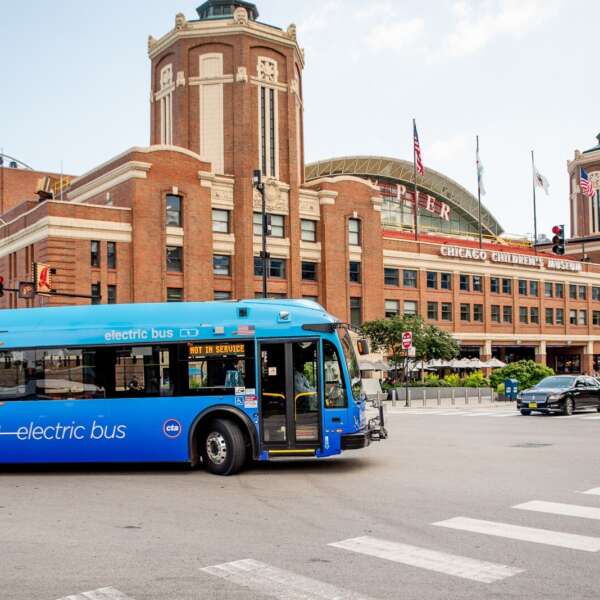Clearbrook transportation services connect individuals with disabilities to their communities
September 2, 2022
September 2, 2022

This is part of our Moving You series, which examines federally funded programs managed by the RTA that expand transportation options and access for all.
Individuals with intellectual and developmental disabilities (IDD) deserve to be members of their communities just like anyone else, but oftentimes that community connection relies on the ability to get places, which can be a challenge. For many with IDDs, driving and navigating fixed-route transit service is not an option. Clearbrook, a nonprofit based in Arlington Heights, fills that transportation gap with on-demand transportation services and the “Clearbrook Loop,” a vehicle that travels on a fixed loop between key locations run by the organization.
Clearbrook’s transportation services operate within a 60-mile radius of the organization’s main office in Arlington Heights, serving individuals who reside in each county of the RTA’s six-county region and beyond. Clearbrook provides 405,000 rides for about 1,000 individuals a year. This year, the RTA will provide $200,000 in federal funding to support Clearbrook’s transportation services through the Section 5310: Enhanced Mobility of Seniors and Individuals with Disabilities Program. Additionally, the RTA will allocate nearly $240,000 in federal funding to a collective of nonprofits, including Clearbrook, to study the feasibility of consolidating and coordinating the current agencies’ routes, support services, scheduling software, and in-vehicle technologies.
Clearbrook Special Projects Coordinator Sheila Lullo said transportation services are imperative for a community-based organization. “We believe—and I think more and more there’s a real push for this—that people should be integrated in their communities,” Lullo said. “Accessing any of their services in their communities is a better way for people with intellectual and developmental disabilities. So we have to find ways to support these people to get into their communities and be a part of the life of that community.”
Clearbrook offers a wide variety of services and programs to about 8,000 adults and children with IDD annually. The organization has the largest home base program in the state, meaning services are provided to individuals in their family home rather than requiring individuals to live in Clearbrook housing to access services. Clearbrook also runs about 54 small group homes, ranging in size from one person to eight people—these are individual homes just like anyone would live in within a residential community. The organization also runs four intermediate care facilities, or residential programs for individuals who have greater medical needs. Additionally, Clearbrook runs a community employment program and two community mental health locations. In order to take advantage of all Clearbrook has to offer, and all that the larger community has to offer, individuals with IDD rely on the organization’s transportation services. Without them, they could face isolation and struggle to enjoy independence.
“We aren’t a campus model like you see in some organizations; we really believe in people accessing services in the community to the extent that they can,” Lullo said. “That’s a great ideal, but it is challenging from a transportation perspective.”
For example, in a small group home serving six people, individuals may be going to three or four different day programs, some operated by Clearbrook, some by other providers. Or maybe someone is going to a recreational opportunity in the community, or to a class, or to work. All of this complexity has led to Clearbrook exploring partnerships that could increase efficiency and service to their participants. They are working with Little City Foundation to share vehicles to get people to their jobs. They’re having conversations with the McHenry County Division of Transportation to see how they might collaborate with MCRide. And they’re members of a collaborative of other nonprofits looking to study mobility management across the region.
“Philosophically, we believe in collaboratives. We believe that we can all make better use of resources if there are ways we can collaborate and not duplicate services,” Lullo said. “If Little City Foundation’s vehicle is going to be in an area where our vehicle is, is there a way for us to use only one of our vehicles? Even further, are there ways we can collaborate and share resources with other service providers? It’s always important to look and be willing to stretch our thinking.”
Subscribe to our Newsletter
Related Articles
 How to navigate the Democratic National Convention using public transportation
How to navigate the Democratic National Convention using public transportation
The Democratic National Convention is coming to Chicago’s United Center and McCormick Place August 19-22, 2024, and with it will come roughly 50,000 visitors...
July 25, 2024 How to use transit to explore museums in the Chicago region
How to use transit to explore museums in the Chicago region
The Chicago region is home to countless accessible cultural and educational amenities including 150 museums across several counties. The most cost-effective ...
July 10, 2024 RTA welcomes summer 2024 interns
RTA welcomes summer 2024 interns
This summer the RTA welcomed six new interns from Chicago-area universities. The interns work in various departments including Communications, IT, Strategic ...
June 27, 2024 Four months into the Access Pilot Program, over 3,000 Metra riders experiencing low incomes enrolled for more affordable fares
Four months into the Access Pilot Program, over 3,000 Metra riders experiencing low incomes enrolled for more affordable fares
On February 1, RTA launched the Access Pilot Program in partnership with Cook County and Metra, extending reduced fares to eligible Metra riders experiencing...
June 13, 2024 How to use transit to celebrate Pride Month in the Chicago region
How to use transit to celebrate Pride Month in the Chicago region
June is Pride Month, a time to honor and celebrate Lesbian, Gay, Bisexual, Transgender, Queer and Questioning (LGBTQ+) individuals in the United States. The ...
May 31, 2024 How to use transit to enjoy summer in the Chicago region
How to use transit to enjoy summer in the Chicago region
Summer weather is here and although the season can feel short for many Chicago residents, there is no shortage of fun to be had. To celebrate the sunshine, t...
May 24, 2024